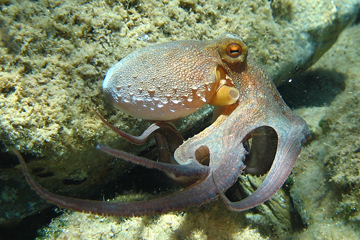Researchers have documented for years how noise pollution impacts dolphins in whales, but a new study in Frontiers in Ecology and the Environment finds that even low intensity noise can severely injure cephalopods, which include octopus, squid, and cuttlefish. The injuries are bad enough to possibly lead to stranding and death, thereby providing a feasible explanation for a number of recent strandings, including giant squid washing ashore in Spain.
“This is the first study indicating a severe impact on invertebrates, an extended group of marine species that are not known to rely on sound for living,” says Michel André, Technical University of Catalonia in Barcelona, in a press release.
Researchers subjected four species of cephalopods—European squid (Loligo vulgaris), common cuttlefish (Sepia officinalis), common octopus (Octopus vulgaris), and Southern shortfin squid (Illex coindeti)—to low intensity and low frequency sounds (between 50 and 400 Hertz) for two hours. Following the noise exposure, researchers found damage to species’ statocysts, which are sensory organs that balance the cephalopods. Inside the statocysts hair cells had ruptured, nerve fibers had swelled, and some statocysts even suffered lesions. These holes continued to grow larger hours after exposure.
 The European octopus, and other cephalopods, are more sensitive to even low-frequency sounds than researchers expected. Photo by: Gewöhnlicher Krake. |
“We expected some lesions after noise exposure but not the level of trauma that we found. What we found was typical of what you might find in mammals after violent, high intensity sound exposure,” André told The Great Beyond.
Given the low intensity of the sounds used in the experiment, researchers believe the ‘louder’ sounds encountered in the ocean would significantly impair squids, octopi, and cuttlefish.
“The impact of continuous, high intensity noise pollution in the oceans could be considerable. For example, we can predict that, since the statocyst is responsible for balance and spatial orientation, noise-induced damage to this structure would likely affect the cephalopod’s ability to hunt, evade predators and even reproduce; in other words, this would not be compatible with life,” André explains.
Underwater noise pollution is caused by offshore drilling—and other excavation activities that use seismic surveys to locate deposits—cargo transportation, industrial fishing, and even recreational boating. Studies have shown that some marine animals actually become louder to be heard when confronted with deafening sounds in their environment.
“It left us with several questions,” André says, “is noise pollution capable of impacting the entire web of ocean life? What other effects is noise having on marine life, beyond damage to auditory reception systems? And just how widespread and invasive is sound pollution in the marine environment?”
Related articles
Amazing reefs: how corals ‘hear’, an interview with Steve Simpson

(07/21/2010) Corals aggregate to form vast reefs, which are home to numerous species and provide vital ecological services such as protecting shorelines. However, coral reefs are one of the most threatened ecosystems in the world due to many factors, such as global warming and ocean acidification. Recent research by Simpson and his team of scientists has shown that corals, rather than drifting aimlessly after being released by their parent colonies and by chance landing back on reefs, instead find their way purposefully to reefs by detecting the sound of snapping shrimps and grunting fish on the reef. However, that discovery also means that the larvae might struggle to find reefs when human noises, like drilling or boats, mask the natural ocean sounds.
Study confirms that sonar can cause deafness in dolphins
(04/08/2009) A new study in Biology Lettersconfirms what marine biologists have long suspected: loud sonar can cause temporary deafness in dolphins, possibly explaining some mass strandings. The study, using a captive dolphin in a controlled experiment, found that sonar at high prolonged levels could even lead to slight behavioral changes.
Supreme Court lifts ban on sonar testing, whales lose
(11/12/2008) A Supreme Court decision will allow the Navy to continue its of sonar in training exercises off the coast of California, a defeat for environmental groups who say sonar is harmful to whales, reports the Associated Press.